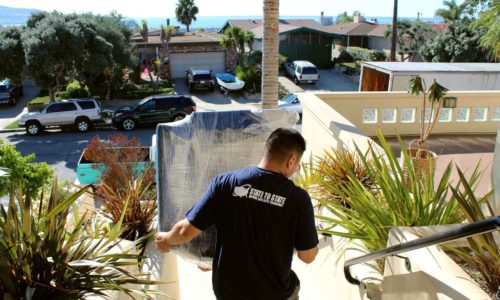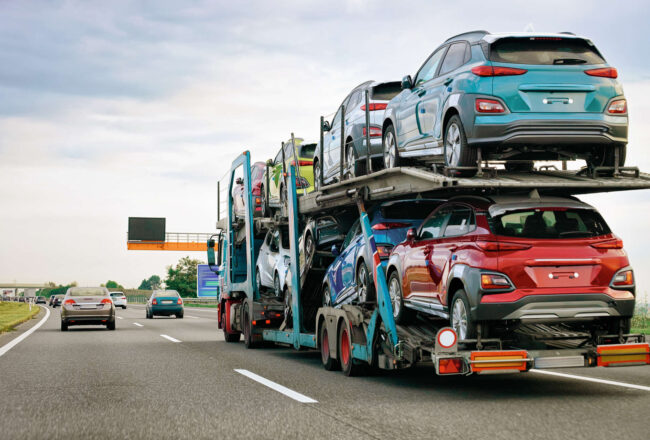Did you know that relocation costs mainly depend on the amount of stuff you’re planning to transfer? The average American household has 300,000 items in it. So, if planning to relocate interstate, a crucial question to ask yourself is what to get rid of when moving.
The Average Size of the American Home Almost Tripled Over the Years
If you’re an average American and have two-car garages, you probably don’t have room to park your vehicles inside of them. Actually, around 30% only have enough space for one car. What does that mean? The average size of the American home has nearly tripled over the past decades. Imagine what arduous work to expect when planning to move your family to another state.
It doesn’t matter whether you’re moving from a small town to a big city, or even relocating out for the first time, changing your address for a love long-distance relationship. Either way, you’ll have a lot of things to think about – from creating a checklist for moving to another state to obtaining packing materials for the relocation. You also need to know what items movers won’t move and find the cheapest way to move out of state.
If you ask yourself What should I get rid of when decluttering, you should definitely learn how to downsize for a move. It’s actually not really hard to perform that. Luckily, with our long-distance relocation tips, you can experience a stress-free relocation preventing anxiety about moving out.
Keep reading and find out how to decide what to get rid of when moving. We guarantee you’ll get a clearer picture of how to organize your move, avoiding to pack most commonly forgotten things, and, above all, ward depression after moving off.
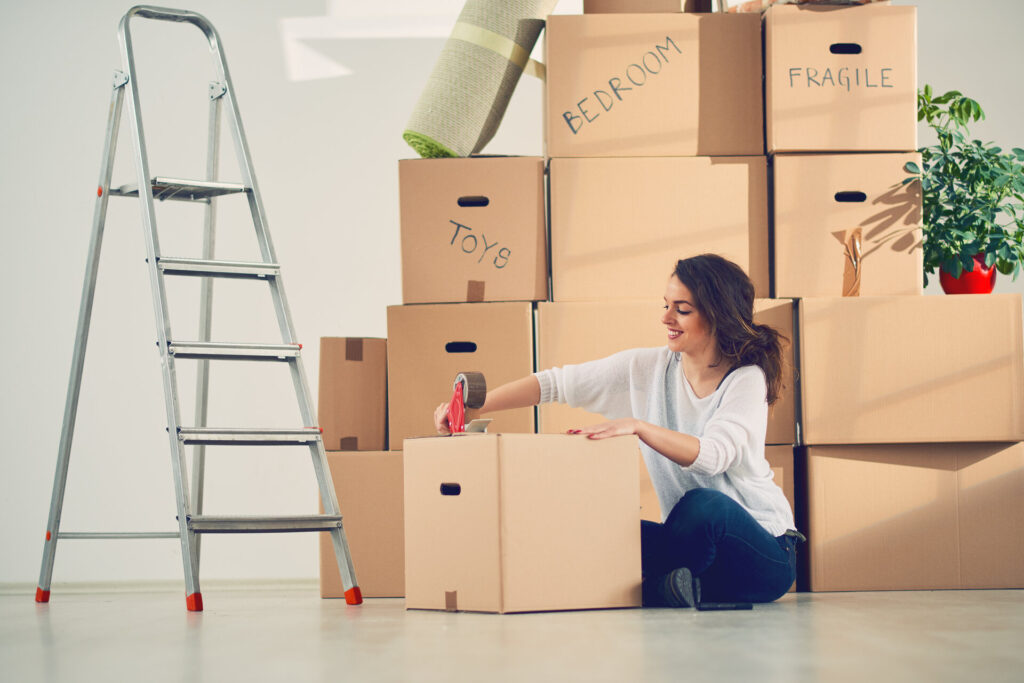
How Do You Get Rid Of Stuff When You Move?
The packing process can be really tricky and demanding, especially if you’re planning last-minute moving. Of course, you can always get your friends’ help or crew of state to state movers. Yet, even the most perceptive and the most skillful person won’t be able to estimate what items you would like to see in a future apartment and what to get rid of.
It’s not only about moving essentials but the entire household. In addition to organizing important documents at home, you have to get a clear picture of your belongings that should be stored for shipping and those that will be tossed, sold, or donated. That said, first, think about creating an excellent moving to another state checklist in order to move efficiently:
- Organize a successful garage sale,
- If you’re thinking about how to move out of state on a budget, sell possessions online, and make some extra cash,
- Donate clothes and furniture you can’t sell, because moving furniture can be really expensive,
- You can always recycle old magazines and books you can’t sell or donate to charitable organizations.
Why Is It Important to Declutter a House Before Moving?
When starting a new life, the truth is you’ll walk around the house wondering What should I get rid of before moving. Decluttering your home will not give you just some peace of mind. It will lighten your load significantly. When moving to a new state, the reasons like how to get a job in a new city, or what you need to rent an apartment will be good enough to cause anxiety.
As well as latent thoughts such as Should I move back home? So, do yourself a favor when packing a moving truck. Less household items mean to have less to worry about and less to clean after settling down.
How Do You Minimize When Moving or How to Decide What to Toss?
As you already know, one of the most important things to do when relocating to a new state is to downsize or invest in new possessions. So, how do you decide what things to get rid of when moving? Before you start, make a list of several must-to-do steps:
- Start sorting as early as possible – as soon as you decide to move out,
- Decide about categories – “keep,” “throw,” or “maybe,”
- Go room by room, ask for help, make the process fun, and don’t be too harsh on yourself – give yourself enough time to sort everything stress-free,
- Ask yourself practical questions – do you use this item enough to keep it, does it need to be replaced, can you sell it, do you know someone who would like to have this item, does it have sentimental value and alike.
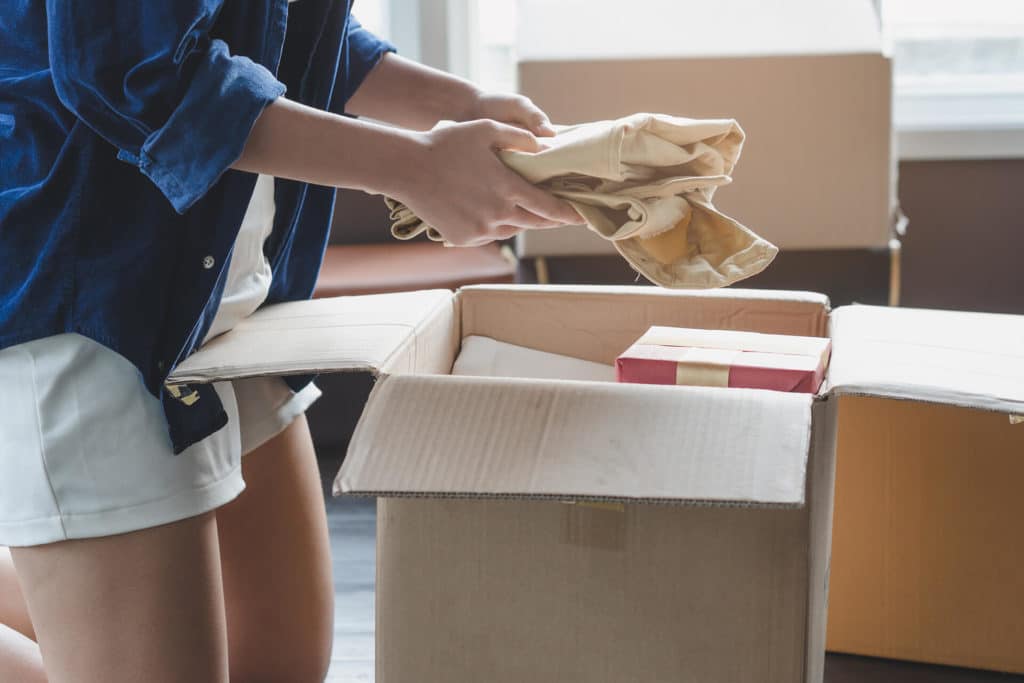
Follow These General Rules of Decluttering Unwanted Items
If you are a person who cannot make a final decision about what to keep and what to throw away, try to stick with these golden rules of decluttering:
- Get rid of duplicates,
- Put an end to all those things you haven’t used for years,
- If possible, digitize some of the many nostalgic items,
- If you possess borrowed items, give them back to their owners,
- Choose covered furniture, such as a closet with a sliding door – this will help your place look tidier and more organized.

What to Get Rid Of When Moving – Divide Up The Things You Don’t Need Anymore Into Several Categories
When planning to facilitate your decluttering and make this process as simple as possible, the best option is to divide up stuff into several categories. This way, you’ll have a clear vision of what to keep and what to do with other things. For instance, you can separate your belongings into these four groups:
- The old and used stuff,
- Unnecessary belongings,
- Useful, but not to your liking, so hardly used,
- Heavy, large, and possessions without aesthetic value.
When Moving, Throw Away the Old and Used Items
Who doesn’t have stuff that stopped being useful several years (or even decades) ago? If this sounds familiar to you, the relocation is a high time to recycle or re-home all things you can:
- Clothes and shoes that don’t fit,
- Outdated electronics and appliances – record player, washing machine, toaster, etc.
- Stray cords,
- Expired goods, like medications, makeup, or food,
- Worn towels, sheets, and dish towels,
- Old paperwork – receipts, tax returns, bills, instruction manuals, etc.
If You Have Too Many Unnecessary Things, Donate, Sell, or Toss
Did you know that 25% Americans have clutter issues in their homes? Piling up unnecessary belongings is another excellent reason to roll up your sleeves and decrease your load’s overall weight. This is often the case if you’re moving with kids because they usually have tons of broken toys, clothes they outgrew, and books they’re not interested in anymore. Another spot in your home where belongings multiply all the time is a kitchen.
So, let’s have a peek into some of these items you should toss, donate, or give:
- Dishes and cookware,
- Glasses and cups,
- Office supplies,
- Tools you’ve never used,
- Extra vases, bottles, chargers, and alike.
Useful, But Never or Rarely Used Items? Free Your Home of These Pieces
If, during your cleaning process, you accidentally come across some stuff you haven’t seen for years, know it’s high time to reevaluate your relationship with those things:
- Books that you’ve never read,
- Old magazines,
- Holiday decorations that never ornament a fir tree, even when it’s Christmas,
- Baby gear,
- Broken possessions, that are not in a good condition, and can’t be easily fixed,
- Old forms of media, such as VHS tapes, CDs, video games, etc.
- Too many cups and mugs.
Think Twice About Things You Really Want to Place Into a New House or Room
Do you really need a pool at your new place? Or maybe that gardening tools or a hose? Think about your prospective city, your future neighborhood, and the climate in which you will live. After weighing the pros and cons, consider not to pack some of these items:
- Sectional furniture,
- Curtains,
- Threadbare rugs,
- Dining room set,
- DIY decor items,
- Piano, especially if no one is playing it anymore (relocating a piano is a demanding task that can cost you both money and nerves.)

Not Having Enough Room in a New Place for Some Old but Precious Stuff? Temporary Storage Might Be a Solution
Of course, you can’t throw everything away or just sell. We all have some old belongings, not shiny and gleaming, but with their own personality and character. Whether you bought these items in some exotic country or received them as a wedding gift, they are unique for you. Maybe they are not exposed in your living room but are covered in the attic or garage due to their bulkiness.
Still, those possessions are valuable to you, and you don’t want to leave them. If your future home is not suitable for them, don’t pile it up there. You can always rent a temporary storage unit and place your valuables in it.
Once you decide what to do with them, or if you eventually find a proper place in your home, they will get a new purpose in your life. Of course, donating to dear people is always a great option.
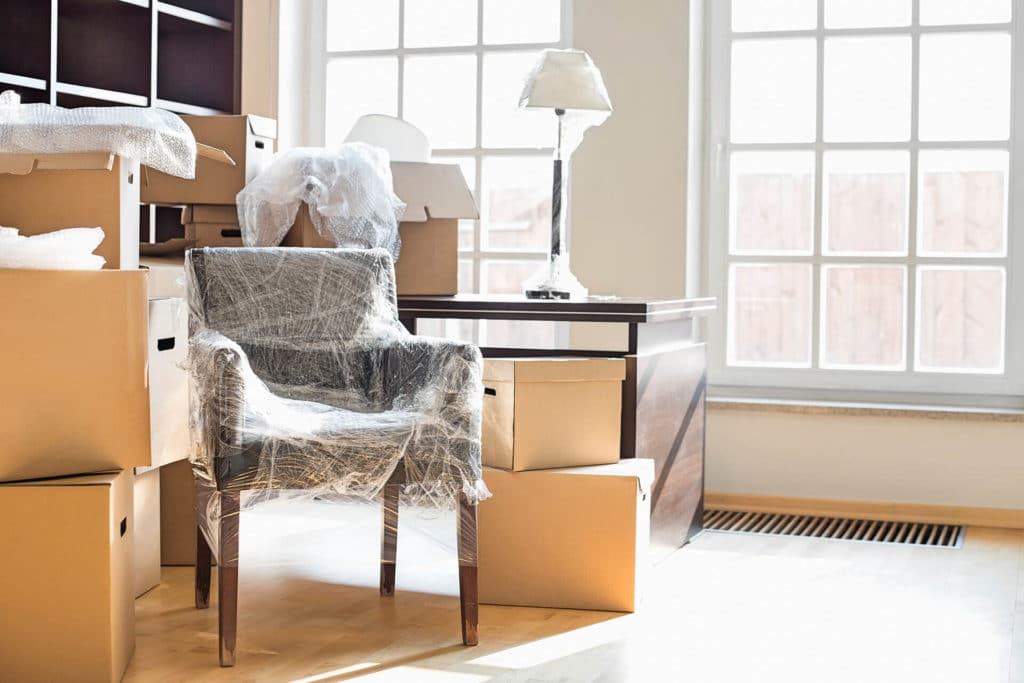
Additional Tips on How to Get Rid of Stuff Before Moving
Whatever your reasons to move are, you’d like to become familiar with all possible ways to save some money when relocating to a new state. For that reason, it’s good to know how to organize packing to move, cut down on clutter, and get some additional money. So, let’s take a look:
- Repurpose old things instead of buying pricey furniture,
- Local flea markets, car boot sales, or pawn shops might be great places to sell your wares,
- Try out Facebook Marketplace.

After Hard Work Has Been Done, It’s Time for State to State Movers to Take the Stage
Sorting out your stuff and deciding what to keep and what to sell, throw, or donate is exhausting work, but it’s just the tip of the iceberg. Sometimes, people just don’t have the energy or time to deal with the whole process from the beginning until the end because there are too many steps to be taken, carefully and well planned.
For that reason, your interstate moving will be safe only in the hands of state-to-state movers. When hiring professional movers, you can rest assured that all your belongings will be well-handled and cared for. Not only packing services but also custom crating and loading and unloading services, as well as auto transport.
Moving state to state is challenging, especially when you have to organize all your belongings and sort them out in time. So, leave the hardest part of the relocation process to State2State Movers. Give us a call and allow yourself to dream about your new life in a well-packed home.





